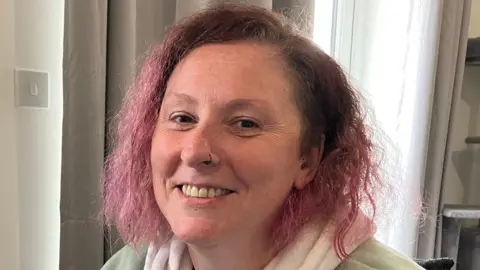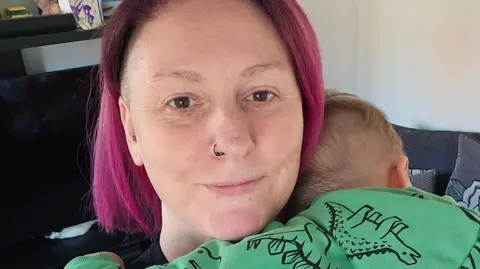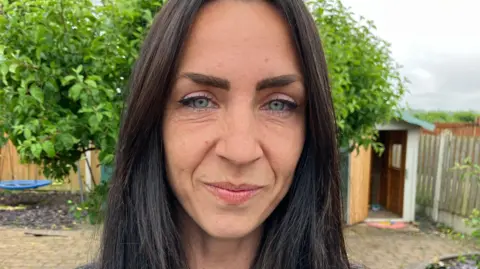'You wouldn't expect a birth parent back at work the next day'
 BBC
BBCA mother has called for "equality" for carers who take on responsibility for children in the family who are not their own.
Under current legislation, kinship carers are not entitled to statutory paid employment leave when they take on the care of a child – unlike families who give birth or adopt.
Samantha, 41, from Doncaster, became responsible for her seven-month-old great-nephew when social services deemed she was the only family member who could take him.
She said the decision led to her giving up her job because she was unable to take any time off to care for him.
She told the BBC: "It was a very difficult decision I had to make because I thought I was done with nappies, toddlers, and things like that.
"I've got two teenage children of my own, so it was a very difficult decision to let him come.
"I worked in a school, so it wasn't the easiest profession to be in to ask for time off, but I did ask for time off for him to come and settle and I wasn't given any straight answers.
"I asked to reduce my hours, because there's a lot of ins and outs of being a kinship carer, and I was told no.
"So I had to make the difficult decision to quit my job to be able to take care of him."
 Kinship
KinshipSamantha is calling for a change in the law to allow kinship carers to take statutory paid employment leave.
"You wouldn't expect to give birth to a baby and go to work the next day. So why should we?" she said.
"We haven't birthed the baby but we made a massive change in our lives to take that child on.
"We should have equal rights to people who have given birth or adopted."
Two-and-a-half years later, Samantha has not been able to go back to work.
"I've been struggling with my mental health, as a kinship carer, it can be quite isolating.
"I've got a toddler to look after and my own children as well so I've not been able to get back into a job.
"It's been a struggle. I would have had a steady income if I had been able to stay in work, but now I have to rely on benefits.
"We've had to move house because of taking him on, and I can't even do things like put money away for a shed for the garden."
Charity Kinship is backing Samantha's call and is urging the government to consider the changes as part of its review of parental leave due to start this summer.
According to the charity, nearly half of kinship carers (45%) lose jobs and careers when they begin to raise a relative or friend's child to stop them going into care.

Natalie, also from Doncaster, was handed her three-month-old nephew in 2020.
"He was handed like a parcel at my garden gate by social services, on a hot summer's day. and came with nothing except some winter clothing and blankets," she said.
She was given a week's notice that a baby was coming into her care.
"You don't get any time to prepare physically or mentally, for items you might need," she said.
"As a single person I had nothing for a child. I was working full-time."
Unlike Samantha, Natalie's employer was supportive of her decision.
"Imagine having a three-month-old baby, feeding every two hours, as a single parent," Natalie said.
"They tell you to sleep when the baby sleeps, but I needed to work.
"It felt impossible to try to juggle both.
"I had no idea there was no statutory support.
"I assumed because of adoption leave and biological parents getting leave that you would fall into that because you're becoming a parent.
"So it was a complete surprise that we don't get anything."
Natalie said she worked 10 years to build her career, but she would still make the decision to care for her nephew "every time".
"He's been the best thing that ever happened. The fact I've been able to keep him in the family, and he's been able to build a bond with the rest of his family, is huge.
"Kinship carers deserve support when it comes to work, they shouldn't be forced to make a decision.
"You can't expect someone to take on a child and they next day go to work."
The Kinship charity's data also showed three in four kinship carers (74%) were in paid work immediately before becoming a kinship carer.
Meanwhile, 80% have not returned to paid work since becoming carers.
A spokesperson said: "Unlike other working parents, kinship carers who look after 141,000 children in England and Wales, more than double the number in foster care, do not qualify for statutory paid employment leave.
"Although many take in babies and toddler, they are expected back at work the next day, forcing them to either quit their jobs or take unpaid leave.
"We are calling on the government to introduce a statutory right to paid leave for kinship carers on a par with adoptive parents and are urging the government to address this unfair gap in the law and include kinship care in its review of parental leave in June."
A government spokesperson said it was committed to carrying out a review of the parental leave system to "ensure it best supports working families".
They said: "Our Plan for Change is on the side of working parents, which is why we are making paternity leave and unpaid parental leave day one rights under the Employment Rights Bill."
Listen to highlights from South Yorkshire on BBC Sounds, catch up with the latest episode of Look North
